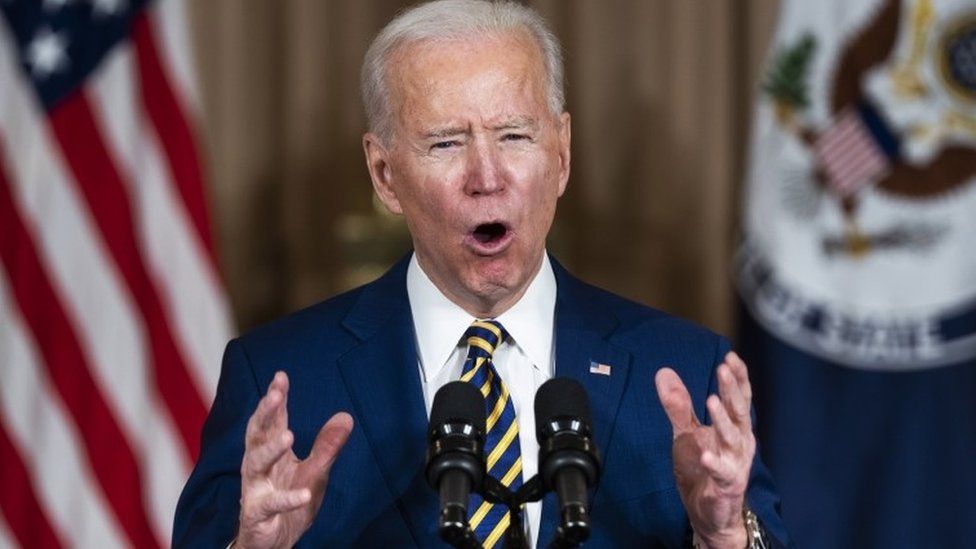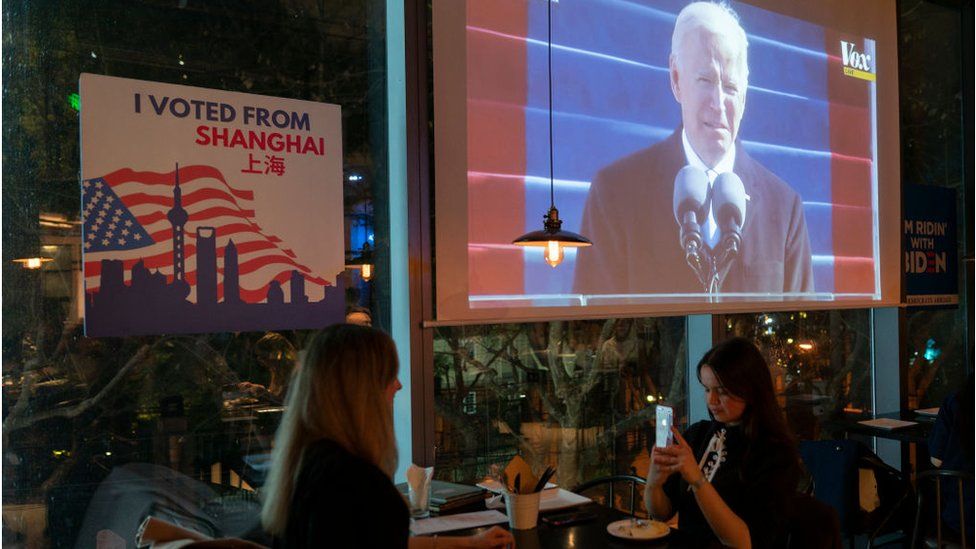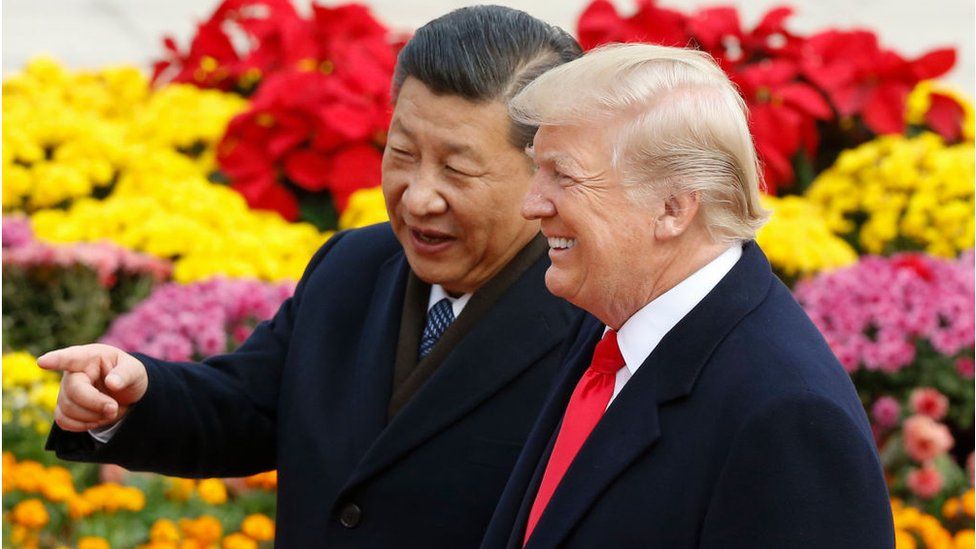What the US really wants from the China talks
BBC State Department correspondent
March 17 2021
On the day of Donald Trump's big "Stop the Steal" rally outside the White House in January, I spotted a sign that seemed a bit off message: "China for Biden."
Trump's supporters were focused on his claim of massive election fraud. Just down the road they were poised to begin storming the Capitol Building, demanding that the results be overturned.
The white middle-aged woman holding the sign wanted that too, but because "China is America's biggest threat," she told me.
"(Joe) Biden sold us out" to Beijing and only Trump can "protect us," she said, before segueing into a tale about a new world order dominated by China, shored up by eugenics and dark intentions to merge humans with artificial intelligence.
I thought it a remarkable example of how the pandemic, which originated in China, had fed into the thicket of right-wing conspiracy theories that animated the crowd.
Despite her concerns about President Biden, though, there is rare bipartisan conviction that China is a unique threat.
Biden and Xi - Round Two
It's true that Biden was the tip of the spear for Barack Obama's policy of engagement with China, as vice-president investing in a relationship with his then counterpart Xi Jinping.
But his "old friend" Xi has since become a leader criticised in the US for a brand of personal authoritarianism, and Biden has excoriated his government for "coercive and unfair" trade practices.
This month the new Secretary of State Antony Blinken described China as "the only country with the economic, diplomatic, military, and technological power to seriously challenge the stable and open international system."
So a high-level meeting in Alaska on Thursday will be the first chance for the administration to show how it intends to handle what Blinken called "the biggest geopolitical test of the 21st century."
He and the National Security Advisor Jake Sullivan will sit down with China's most senior foreign policy official, Yang Jiechi, and Chinese Foreign Minister Wang Yi.
'Straight talk' and 'Strength'
What do they hope to achieve? This is not being billed as meeting for reaching agreements. It's a meeting for "straight talk" to set the ground rules for the relationship.
Already the Americans have signalled their approach. The new mantra in Washington is to engage China "from a position of strength."
First, the face-to-face encounter will be a low-key, one-off affair. Traditionally the secretary of state visits Japan, South Korea and China on his or her big trips to Asia. This week only Tokyo and Seoul were on the itinerary for Blinken's inaugural international foray. China is relegated to a stopover on the way back.
And the meeting will be on American soil: that was extremely important, said a senior administration official.
The idea is to counter the Chinese perception that the United States is on the decline, says Michael Green, the senior vice-president for Asia and Japan Chair at the Center for Strategic and International Studies.
Chinese commentators like to say that the "winds are blowing to the East." The financial crisis of 2008, the Capitol Hill riot of 2021 and the years of Trump's unilateralism in between have reinforced a view in China that the US has been weakened inside and out.
"This meeting in Alaska is geared to show the Chinese are wrong on all three counts," says Green. "The schoolyard version of this is to say: "You're not so great…yeah you're big, but we like hanging out with our allies, democracies, because they're cool."
Alliances are certainly the bedrock of the strategy. President Biden and his top national security officials deliberately met their counterparts from Asia's major powers - India, Australia, Japan and South Korea - virtually or in person, in the weeks leading up to Alaska.
Another aim is to project inner strength.
The "first order of business," said a second senior US official, will be to "explain domestic priorities" in terms of combatting the Coronavirus and reviving the Covid-hit economy.
The next is also to show that the US - and the administration - is internally unified around the idea that the relationship is a strategic competition. That's why for the first time the secretary of state and national security advisor are meeting their counterparts together. And they can point to pending legislation that's taking shape in the senate as a bipartisan effort to curb China's global influence.
What will follow is a long list of concerns, including China's treatment of Uighur Muslims, its quashing of democracy in Hong Kong, its militaristic posture in the South China Sea, and its economic "misbehaviour."
Areas of potential cooperation are also expected to be raised, such as combatting climate change, ending the war in Afghanistan, containing pandemics, as well as dealing with North Korea's nuclear weapons and Iran's nuclear programme.
"We want a robust and frank conversation with a power that's a main competitor" said a third US official. "We don't want them to be operating under illusions about our tough approach and we want our guys to hear from them."
China looks for a reset
The Chinese are looking for a reset after relations hit rock bottom under Trump. China's Foreign Minister Wang Yi has said that Beijing is ready to reopen "constructive dialogue."
But he's also urged Washington to remove Trump's tariffs on Chinese goods, to stop "suppressing" the Chinese tech sector, and to stop "smearing" the ruling Communist Party.
And he's warned the US to stop interfering in Beijing's internal affairs, a reference to policies in Tibet, Xinjiang, Hong Kong and Taiwan that are redlines for the Chinese.
The Biden administration has dropped Trump's confrontational and erratic approach but maintained many of his policies, and it is wary about the shift in tone China is seeking.
"We're looking for deeds, not words," said the first US official, mentioning an end to "economic coercion" against allies such as Australia as a specific demand before the US China relationship could take steps forward.
"But our expectations are realistic," she added. "It's more understanding over time how do we shape that behaviour change that we seek."
'An historic and fundamental debate'
One change on the American side is an end to the cold war rhetoric used by top Trump officials, who focused on what they saw as the irredeemable nature of the Chinese Communist Party. But President Biden does continue to frame the relationship in ideological, rather than primarily economic, terms.
"I believe we are in the midst of an historic and fundamental debate about the future direction of our world" he wrote in his interim national security strategy, citing the competition between democracy and autocracy.
This is a break from the Obama era, but not a complete one.
"I'm sure Blinken wants to give (the Chinese) a message to take back that can be built on," says Green. "Not an olive branch, but a clear picture of what's happening. And the opportunity down the road to work on issues. That's really the biggest difference…that piece Trump would never have done."



No comments:
Post a Comment
Comments always welcome!